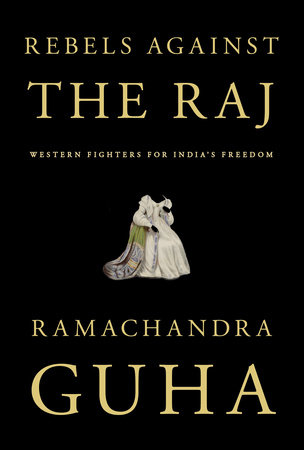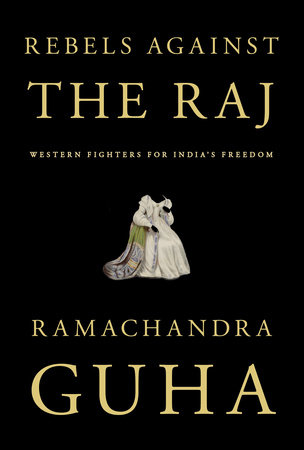By Amit Roy/Telegraph India
London, June 16: Modern-day Brits have honored historian Ramachandra Guha for a rather unusual book that is mainly about white Brits who were severely punished for going against the British establishment of their day to give their all for Indian independence.
On Monday, Guha was in London to collect a £5,000 cheque for winning the highly regarded Elizabeth Longford Prize for Historical Biography 2023 in its 20th anniversary year for Rebels against the Raj: Western Fighters for India’s Freedom (published by William Collins).
The judges made a point of stressing the book has particular relevance to contemporary India.
“As Guha points out, oppression does not disappear with the ending of colonial rule, and the ideas and priorities incisively drawn out in this book deserve urgent attention in today’s India,” the chair of the judging panel said in a pointed remark.
The annual prize “was established in 2003 in affectionate memory of Elizabeth Longford (1906-2002), an acclaimed historical biographer and family matriarch best known for Victoria RI (1964), her scholarly and readable life of Queen Victoria, for her magisterial Wellington: Years of the Sword (1969), and Wellington: Pillar of State (1972)”.
Guha also received a bound copy of Longford’s autobiography, The Pebbled Shore (1986).
This book is now in with such previous big-name winners as David Gilmour’s The Long Recessional: The Imperial Life of Rudyard Kipling; Frances Wilson’s How to Survive the Titanic: The Sinking of J. Bruce Ismay; Charles Moore’s Margaret Thatcher: The Authorised Biography, Volume 1: Not for Turning; and Julian Jackson’s A Certain Idea of France: The Life of Charles de Gaulle.
Roy Foster, chair of the judging panel — it included Elizabeth Longford’s patrician daughter and granddaughter, Antonia Fraser and Flora Fraser, respectively, and Rana Mitter of Oxford University — said: “From an immensely strong field the judges have chosen a book where the author’s deep empathy and impressive scholarship are lit up by a passionate regard for his subjects.”
He explained Guha’s Rebels “profiles seven people, from Britain, America and Ireland, who adopted India’s struggle for independence and in doing so found their own destinies. The experience of India changed their ideologies, their spirituality, and often their names.
“In tracing their relationships revolving around the magnetic figure of Gandhi, Guha adds a new perspective to the Mahatma’s life, on which he has already focused so rewardingly in his multi-volume biography.
“Alert to his subjects’ disappointments and occasional delusions, he salutes their commitment to a new way of life and their prescience about the needs of a post-colonial world and India’s place in it. Rebels Against the Raj shows how historical biography can illuminate the temper of the times through immersion in individual lives.”
Six of the seven Guha profiled in his book died in India.
The author said Indians may have heard of a couple of them — “Annie Besant because of her theosophy and also because she was the first female president of Congress”, and Mira Behn, an admiral’s daughter who had changed her name from Madeleine Slade and was played by Geraldine James in Richard Attenborough’s Oscar-winning Gandhi.
But the book has other heroes too — for example, Samuel Stokes, an American Quaker who changed his first name to Satyanand, took an Indian wife, Agnes, and more or less became a Hindu.
Then there was the campaigning journalist Benjamin Guy Horniman, who outraged the colonial masters by supporting Indian independence; Philip Spratt, a Cambridge graduate who helped establish the Communist Party of India; and Richard Ralph Keithahn, an American missionary who worked to educate and provide health care to villagers in south India.
British-born Catherine Mary Heilemann — renamed Sarala Behn — set up a girls’ school and was a pioneering environmentalist campaigner in north India.
When the book came out, Guha told The Telegraph, where he is a columnist: “The lives and doings of these individuals constitute a morality tale for the world we currently live in. This is a world governed by paranoia and nationalist xenophobia, with the rise of jingoism in country after country, and a corresponding contempt for ideas and individuals that emanate from outside the borders of one’s nation. Narendra Modi and the Rashtriya Swayamsevak Sangh in India, Donald Trump and the white supremacists in America, Boris Johnson and the Brexiteers in England, Xi Jinping and his Confucian Community Party in China — all see themselves as uniquely blessed by history and by God. No foreigner, they believe, can teach them anything. This book tells us that they can.
“The focus of this book is on individuals who decisively changed sides, identifying completely with India, meeting Indians on absolutely equal terms as friends and lovers, and as comrades on the street and in prison too.”
Guha, who is now back home in Bangalore — “my mother stays with me and she is 94 so I don’t extend my foreign travel beyond what is absolutely necessary — spoke to this newspaper on Wednesday.
He revealed he was inspired by the life by Verrier Elwin when he was an MA student at Delhi University. “He was a maverick British anthropologist who worked with Indian Adivasis.”
Guha went on: “Basically, he was an Oxford scholar who was a priest, came to India, met Gandhi, left the church, started working among Adivasis in central India, became a leading expert on them, and Nehru sent him as an adviser to the Northeast and he spent his last 10 years there.
“I was charmed by his work and his writing and decided economics is not for me and I did a PhD in sociology and moved to history because of Elwin. Elwin’s big regret was that unlike his exact (white) contemporaries he was never arrested. He thought there was something lacking in his CV. The idea of this book (Rebels against the Raj) occurred while I was working on Elwin more than 25 years ago.
“Without Elwin I would not have written this book, without Elwin I would not have become a biographer, without Elwin I would not have done a PhD, I would have become a boxwallah. Like most Indians of my generation, I might have joined the IAS or something rather mundane. So reading Elwin changed my life.”
END
The post Ramachandra Guha’s “Rebels Against the Raj” bags Elizabeth Longford Prize for historical biography appeared first on NewsIn.Asia.




